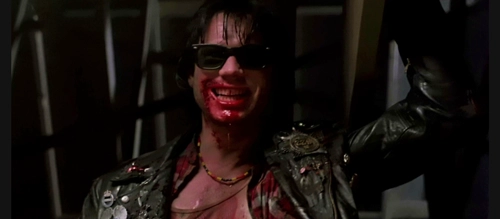Kathryn Bigelow Movies Ranked
2. Near Dark (1987)

1987 was a good year if you were a vampire fan. Along with the cult classic The Lost Boys, Kathryn Bigelow’s sophomore effort Near Dark gives us a southern gothic affair.
Combining the rebellious youth culture from The Loveless with a bigger budget, better cast, and a script that doesn’t hang around doing almost nothing in the same place for ten minutes at a time, the film follows Caleb, bitten and turned by part of a travelling vampire company in an RV run by Lance Henriksen, touring the states and eating whomever they want.
A far more mature film, Near Dark is easily identifiable as an inspiration for John Carpenter’s Vampires, another vampire film set in the southern states, and the travelling vampire troupe hunting the Steam in Stephen King’s “Doctor Sleep” book and film adaptation by Mike Flanagan. Caleb’s character always embodies the struggle between personal, anarchic freedom and familial responsibility, showing the next step in filmmaking from The Loveless, a look at a far more conflicted individual than Dafoe’s lead.
Gloriously shot with some terrifying images (the gang stood on the moonlit hill in the mist is wonderfully haunting), Bigelow’s control over the film is immense. A standout crosscutting sequence midway through the film, showing the moral terror as Caleb tries to bring himself to make his first kill, contrasted with the other vampires revelling in their darkness, is a sequence to be felt gutturally as much as understood through the brain. It’s not only a well made horror film; it’s an incredibly well made film all round.
Recommended for you: Sofia Coppola Movies Ranked
1. Strange Days (1995)

Strange Days has been pretty much forgotten over the years. It was a financial flop at the time and has fallen by the wayside over the coming years. That’s a shame, because with a cast of Ralph Fiennes, Angela Bassett, Vincent D’Onofrio, and Juliette Lewis, and with James Cameron once again in the co-writing and producing seats, it should at least have been remembered.
In the two days leading up to the turn of the millennium, Ralph Fiennes’s Lenny Nero sells SQUID recordings, replays of what the wearer of a special headpiece sees whilst switched on. When he gets the police after him, he gets hold of a particular tape which could alter the face of vast, violent political protests occurring on the streets of Los Angeles.
It’s full-on classic cyberpunk of the best kind. It’s got the down-in-the-gutters hero, with Nero more the anti-hero than Angela Bassett’s Lornette Mason as the real star of the show. It’s got intrigue, grittiness, extreme visuals, eyeball-kicks for miles, subtext to the hilt about reality and voyeurism, memory and illusion, and racially charged political discourse thrown in for good measure. It looks great, sounds great, and with Bigelow behind the camera, everything comes together wonderfully.
Some at the time had issues with the way in which the violence was depicted, but sometimes a dark, grimy film in a fairly dark and grimy subgenre (in this case, cyberpunk), requires something visceral. It is this combination of intelligence and dark visceral imagery that makes the film such an incredible achievement. It’s a complete shame that Strange Days has become one of those obscure little films you watch to complete someone’s filmography, and not just because it is a great film in itself. Because it is an incredible time at the movies, and it is also Kathryn Bigelow’s best film to date.
Recommended for you: 10 Unsung Women Filmmakers of the Silent Era
Which of Kathryn Bigelow’s feature films do you believe to be her best? Is Bigelow one of the most influential filmmakers of all time? Let us know in the comments below, and be sure to follow @thefilmagazine on Facebook and X (Twitter) for more insightful movie lists.

